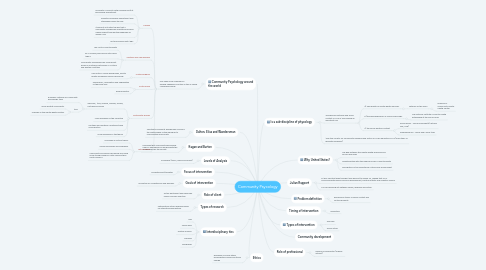
1. Dalton, Elías and Wandersman
1.1. Said that Community psychology concerns the relationships of the individual to communities and society.
2. Kagan and Burton
2.1. Proposed that Community psychology offers a framework for working with the marginalised by the society
3. Levels of Analysis
3.1. Ecological (micro, macro and meso)
4. Focus of intervention
4.1. Competences/strengths
5. Goals of intervention
5.1. Promotion of competences and wellness
6. Role of client
6.1. Active participant who exercises choice and self-direction
7. Types of research
7.1. Participatory action research based on alternative assumptions
8. Ethics
8.1. Emphasis on social ethics, emancipatory values and social change
9. Interdisciplinary ties
9.1. Law
9.2. Social work
9.3. Political science
9.4. Planning
9.5. Geography
10. Community Psychology around the world
10.1. Has been more organized in English-speaking countries in the so called "developed world"
10.1.1. Canada
10.1.1.1. University of Toronto with Professor Bott at Psychology Department
10.1.1.2. Despite Psychology Department was stablished before the war
10.1.1.3. It was not until after the war that a community psychology orientation became clearly evident through the leadership of William Line
10.1.1.4. But was formed until 1982
10.1.2. Australia and New Zealand
10.1.2.1. Has roots in mental helath
10.1.2.2. As in Canada, was formal until earlys 1980's
10.1.2.3. Community Psychology has a prominent profile in Australia, particularly in Victoria and western Australia
10.1.3. United Kingdom
10.1.3.1. Has roots in clinical psychology, mental health and applied social psychology
10.1.4. South Africa
10.1.4.1. Oppression, colonization and segregation of the black race
10.1.4.2. Radical politics
10.1.5. Continental Europe
10.1.5.1. Germany, Italy, Greece, Norway, Poland, Portugal and Spain
10.1.5.1.1. European Network of Community psychology 1996
10.1.5.1.2. Italy
10.1.5.2. More emphasis on the collective
10.1.5.3. Northern and Western countries strong social politics
10.1.5.4. More emphases in the theory
10.1.6. Latin America
10.1.6.1. sociology an critical theory
10.1.6.2. unique influences and emphases
10.1.6.3. Community and social psychology are much more strongly linked in Latin America than North America
11. Community development
12. Is a sub-discipline of phycology
12.1. The specific historical and social context of USA in 1960 played an important role
12.1.1. a) The growth of mental health services
12.1.1.1. veterans of the WWII
12.1.1.1.1. Program of Community Mental Health Center
12.1.2. b) the rapid expansion of clinical psycology
12.1.2.1. The National Institute of Mental Health established at the end of WWII
12.1.3. c) the social-political context
12.1.3.1. social reform - social movements(Vietnam War, LGB)
12.1.3.2. Progressive era: Levine and Levine 1992
